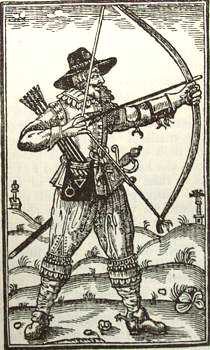Victory in France
The English victories at Harfleur and Agincourt became an expression of the surging patriotism of an England prospering under Elizabeth. Henry defeated the French at Agincourt despite overwhelming odds as his weary troops attempted to reach Calais, an English stronghold. This victory was acheived largely through use by the English of the deadly longbow.
The victory at Agincourt brought about the treaty of Troyes, dramatized at the play's end, which stipulated that Henry should marry King Charles VI's daughter, Katherine, and in so doing become heir to the French throne.
This treaty, however, did not bring about an end to the warfare. Henry returned twice more to France in order to assert his power, and died of dysentery on his third expedition, six weeks before Charles VI died. Had Henry survived, he would have been the legal heir.
- Explore Shakespeare's use of language in the play.*
- More about the battle of Agincourt.
- See a chronology of events in the period.
Footnotes
-
Playing with language and dialect
Shakespeare plays with regional dialects in the play. Fluellen, a Welsh soldier, Jamy, a Scottish soldier, and MacMorris, an Irish one, all speak with pronounced accents.
There are also extended passages of French in the play; for example 3.4 is entirely in French. It is a comic scene in which the princess Catherine learns some basic English words from her gentle-woman Alice.
